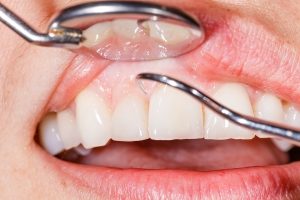The Stages of Gum Disease

A large portion of your dental care in St. Charles should focus on your gums. Without the proper attention, plaque and bacteria might develop along your gum line, which could eventually cause infection and inflammation. Keep reading to learn about the different stages of gum disease so you can figure out how to avoid them:
Gingivitis
Gingivitis is the initial stage of gum disease. It develops when plaque starts to build up along the gum line. If the plaque is not removed, it will continue to irritate the gums until it causes an infection. Pay attention when you brush your teeth. If you notice any swelling, redness, or bleeding in the gums, it might be signs of gingivitis. You should schedule an appointment with your dentist as soon as possible to reverse the gingivitis before it gets any worse. It is very important to brush and floss your teeth daily to keep them clean and healthy. You should also avoid foods that are high in sugar or carbohydrates, which could make the gingivitis worse.
Periodontitis
If you do not treat your gingivitis, it will eventually develop into periodontitis. This more advanced stage of gum disease starts to damage the bones and fibers that keep your teeth in place. Once this happens, you might start to notice pockets in your gums. Food and plaque can fall into these pockets, which puts you at an even bigger risk for further periodontal issues. Visit your dentist to prevent periodontitis from getting any worse.
Advanced Periodontitis
Without proper care, gum disease will eventually turn into advanced periodontitis. This severe stage destroys the fibers and bones that support the teeth. Without support, your teeth might shift or loosen. Some people even lose their teeth from advanced periodontitis. Visit your dentist as soon as possible to get the aggressive treatment that might be able to keep your original teeth in your mouth and prevent any more serious issues in your gums.
